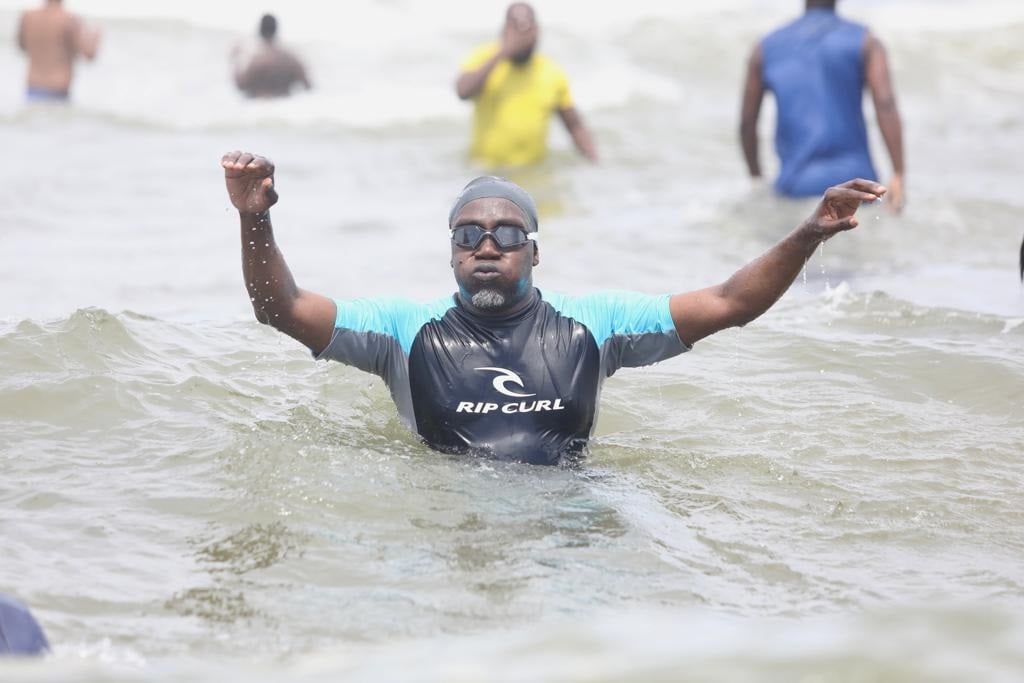
Large numbers of businesses in eThekwini on South Africa’s eastern seaboard – which includes the port city of Durban – rely heavily on tourism. It’s a popular holiday destination, only six hours by road from Johannesburg. Millions of people living inland head to the warm coastline over the country’s extended December/January school holiday break. But maybe not this year. As Anja du Plessis explains, many of the beaches along the Durban coastline aren’t safe to swim in. She explains what’s happened, and why.
What’s the state of the beaches on the eThekwini seafront?
The city’s beaches are facing an ongoing sewage crisis. Many have been closed along the Durban coastline.
From recorded water quality results, it is quite clear that most of the eThekwini municipality beaches are currently not safe for public and recreational activities.
Most beaches have critical levels of Escherichia coli. (E. coli). This is a bacteria found in the intestines of healthy people and animals. But high levels of E. coli in water pose a significant threat to human health as well as aquatic and marine environments. The global and South African acceptable standard for E. coli in marine water is 500 counts/100ml. Most beaches along Durban’s coastline have critical E. coli levels well above this level and should be considered a public health hazard.
Only three of the nine sampled beaches along the city’s extended coastline have acceptable levels of E. coli. They are uShaka, South and Westbrook Main beaches.
ALSO READ | Heading to Durban for holiday? High E. coli levels at beaches could leave you seriously ill
Of major concern is that some beaches have been opened for swimming despite critical E. coli levels being recorded. The beaches of concern include Point, North, Battery, Country Club and Umhlanga Bronze beaches.
E. coli levels in the Umgeni River are also a major public health hazard. Levels range up to over 24 million counts/100ml in the case of Northern Works.
From the data provided, the decision to open some beaches for swimming should be revisited as it poses a major human health hazard due to critical E. coli levels.
I have been conducting research on water quality trends in the area for more than 12 years. Results show a decrease in water quality and compliance over the past two decades.
READ | EXPLAINER: What is happening with eThekwini's beaches, and what is being done about it?
Examples of the decline include increased algal blooms that have led to large-scale fish deaths (especially in the Umgeni River) and the closure of beaches.
About 80% of the pollution in the sea originates on land. Various contaminants (chemicals, nutrients, litter, heavy metals and other toxic substances) are carried by streams and rivers from different land use activities such as farms, industries and urban areas to bays and harbours and finally out to sea.
The magnitude and frequency of pollution can make rivers and ocean water unsafe for humans. It also leads to large-scale environmental destruction such as fish deaths.
The ongoing and escalating sewage pollution in the eThekwini municipality is an example of how continued sewage pollution, chemical spills as well as poor water governance and management can lead to widespread environmental degradation and human health hazards.
What are the causes?
The state of the municipality, specifically in terms of its ability to provide informed water governance and reliable service delivery to its residents and businesses, has been declining at a steady rate over the past two decades. This reached a crisis point in mid-2022 when the majority of beaches were closed, with few being safe for recreational activities.
The ageing water infrastructure has steadily decayed due to non-maintenance, lack of human capacity and financial resources, poor water governance and delayed – or no – action to address the deposition of sewage into various water courses such as the Umgeni River, and ultimately out to sea.
Major floods in April 2022 made the already dire situation worse. The floods damaged water infrastructure and wastewater treatment works, threatening water supply. After the floods, 80% of the drinking water network was out of order.
The floods caused immense sewage pollution coinciding with another massive death of fish at the Umgeni River mouth. In August 2022, large-scale fish deaths were again recorded in the Isipingo Beach lagoon, with more aquatic deaths recorded at the Umgeni River. E. coli was once again determined to be the primary culprit, with major effects on aquatic life and ecosystems.
But the April floods aren’t the sole cause of the current sewage crisis. The failure of water infrastructure and wastewater treatment works has been an ongoing issue over the past two decades, escalating every year.
READ | IN-DEPTH: eThekwini's polluted beaches - Why biggest danger is in the sand - not the water
Vandalism has led to breakdowns and non-functioning of pumps. Some sewage pump stations don’t have a second back-up pump. In the event of the first pump failing – or in the event of prolonged power outages or consistent escalating blackouts – sewage will overflow.
The closure of beaches within the eThekwini municipality is not new. Beaches were closed over the holiday season in December 2021 due to major sewage pollution of the Umgeni River.
Partially treated human waste was, and still is, being deposited into the Umgeni River from a municipal outlet pipe located close to wastewater treatment works.
What’s the impact been?
There’s a growing risk of major human health hazards and risks, specifically cholera, hepatitis and other waterborne diseases transmitted via exposure to sewage bacteria and pathogens in affected rivers as well as the ocean.
The very low level of compliance of microbiological quality (most are on a critical level) as well as continued flow of sewage into rivers, streams and the ocean is of major concern. It affects public health and aquatic ecosystems and causes major financial losses, especially for the tourism sector.
For the moment, the quality of potable water (drinking water) within the eThekwini municipality is acceptable, with 99% compliance. If compliance falls below 95%, and no precautions are taken, the increased concentrations of bacterial or pathogenic concentrations will lead to an increased risk of disease and possible outbreaks of waterborne diseases.
Where do we go from here?
The sewage crisis cannot be solved overnight as it is a legacy issue. The following steps need to be taken to begin to reverse the sitaution:
The money supplied to the municipality to address the aged water infrastructure, poorly and non-functioning wastewater treatment works and other major pollution issues should be monitored by an independent body to ensure that these funds are not misappropriated.
Frequent monitoring of water quality needs to continue. The results, especially for E. coli, should be published and made available to keep the public informed on the current state of its major rivers and beaches.
The lack of accountability, alleged misappropriation of funds, delayed or no action as well as poor water governance should be investigated, addressed and improved upon.
Public-private partnerships should be considered to address the continued sewage crisis. The estimated cost of infrastructure damage across the province has been put at R25 billion (still increasing), and will require productive partnerships and investments.
Finally, beach goers should make sure they’re aware of most recent published water quality results. They should try to avoid beaches that are officially closed and determine which beaches are suitable to use based on published water quality results.![]()
Anja du Plessis, Associate Professor and Research Specialist in Water Resource Management, University of South Africa
This article is republished from The Conversation under a Creative Commons license. Read the original article.




 Publications
Publications
 Partners
Partners























